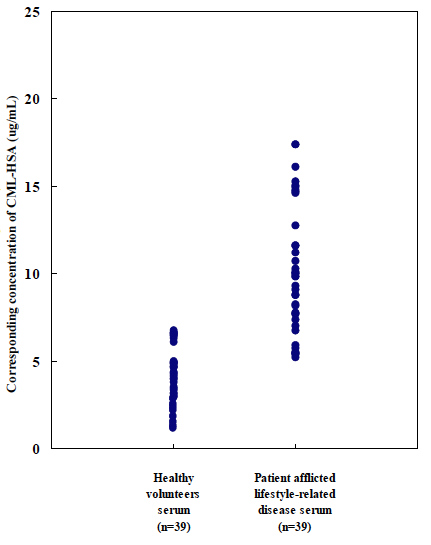| Components |
CML-BSA coated Microplate, Wash Buffer, Sample Dilution Buffer, Standard Dilution Buffer, CML-HSA Standard, Primary Antibody, HRP conjugated Detection Antibody, Substrate Reagent, Stop Solution |
| Citations |
- Fujii EY, Nakayama M. The measurements of RAGE, VEGF, and AGEs in the plasma and follicular fluid of reproductive women: the influence of aging. Fertility and Sterility. 94, 694-700 (2010)(PMID:19376511)
- Moriyama T et al. Involvement of advanced glycation end-products, pentosidine and N-(carboxymethyl)lysine, in doxorubicin-induced cardiomyopathy in rats. Toxicology. 268, 89-97 (2010)(PMID:20004697)
- Xianwen Yi et al. α-Lipoic acid protects diabetic apolipoprotein E-deficient mice from nephropathy. Journal of Diabetes and its Complications. 25, 193-201 (2011)(PMID:20801062)
- Bao W et al. Monocyte CD147 is induced by advanced glycation end products and high glucose concentration: possible role in diabetic complications. Am J Physiol Cell Physiol. 299, C1212-C1219 (2010)(PMID:20810913)
- Zuwała-Jagiełło JJ et al. Advanced oxidation protein products and inflammatory markers in liver cirrhosis: a comparison between alcohol-related and HCV-related cirrhosis. Acta Biochim Pol. 58, 59-65 (2011)(PMID:21403920)
- Karimi J et al. Relationship between advanced glycation end products and increased lipid peroxidation in semen of diabetic men. Diabetes Res Clin Pract. 91, 61-6 (2011)(PMID:20970866)
- Lance A et al. Apolipoprotein E4 Exaggerates Diabetic Dyslipidemia and Atherosclerosis in Mice Lacking the LDL Receptor. Diabetes. 60, 2285-2294 (2011)(PMID:21810592)
- Coughlan MT et al. Advanced Glycation Urinary Protein-Bound Biomarkers and Severity of Diabetic Nephropathy in Man. Am J Nephrol. 34, 347-355 (2011)(PMID:21876347)
- Meloche J et al. RAGE-dependent activation of the oncoprotein Pim1 plays a critical role in systemic vascular remodeling processes. Arterioscler Thromb Vasc Biol. 31, 2114-24 (2011)(PMID:21680901)
- Pettersson C et al. LDL-associated apolipoprotein J and lysozyme are associated with atherogenic properties of LDL found in type 2 diabetes and the metabolic syndrome. J Intern Med. 269, 306-21 (2011)(PMID:21205019)
- Nemoto S et al. Aminoguanidine normalizes ET-1-induced aortic contraction in type 2 diabetic Otsuka Long-Evans Tokushima Fatty (OLETF) rats by suppressing Jab1-mediated increase in ET(A)-receptor expression.; Peptides. 33, 109-19 (2012)(PMID:22154739)
- Tahara N et al. Serum levels of advanced glycation end products (AGEs) are independent correlates of insulin resistance in nondiabetic subjects. Cardiovasc Ther. 30, 42-8 (2012)(PMID:20626403)
- Han D et al. Induction of receptor for advanced glycation end products by insufficient leptin action triggers pancreatic β-cell failure in type 2 diabetes. Genes Cells. 18, 302-14 (2013)(PMID:23410183)
- Machado-Lima A et al. Advanced glycated albumin isolated from poorly controlled type 1 diabetes mellitus patients alters macrophage gene expression impairing ABCA-1-mediated reverse cholesterol transport. Diabetes Metab Res Rev. 29, 66-76 (2013)(PMID:23015358)
- Boschetto P et al. Plasma sRAGE and N-(carboxymethyl) lysine in patients with CHF and/or COPD. Eur J Clin Invest. 43, 562-9 (2013)(PMID:23590548)
- Aoki C et al. Advanced glycation end products suppress lysyl oxidase and induce bone collagen degradation in a rat model of renal osteodystrophy. Lab Invest. 93, 1170-83 (2013)(PMID:23979426)
- Munesue S et al. Low-molecular weight fractions of Japanese soy sauce act as a RAGE antagonist via inhibition of RAGE trafficking to lipid rafts. Food Funct. 4, 1835-42 (2013)(PMID:24191276)
- Malarde L et al. Endurance training and insulin therapy need to be associated to fully exert their respective beneficial effects on oxidant stress and glycemic regulation in diabetic rats. Free Radic Res. 48, 412-9 (2014)(PMID:24393032)
- Machado-Lima A et al. In type 2 diabetes mellitus glycated albumin alters macrophage gene expression impairing ABCA1-mediated cholesterol efflux. J Cell Physiol. 230, 1250-7 (2014)(PMID:25413254)
- Oh MJ et al. Prediction of CML contents in the Maillard reaction products for casein-monosaccharides model. Food Chem. 267, 271-276 (2018)(PMID:29934167)
- da Silva KS et al. N-acetylcysteine Counteracts Adipose Tissue Macrophage Infiltration and Insulin Resistance Elicited by Advanced Glycated Albumin in Healthy Rats. Front Physiol. 8, 723 (2017)(PMID:29018354)
- Zuwala-Jagiello J et al. Influence of Diabetes on Circulating Apoptotic Microparticles in Patients with Chronic Hepatitis C. In Vivo. 31, 1027-1034 (2017)(PMID:28882977)
- Sukino S et al. Effects of a Low Advanced Glycation End Products Diet on Insulin Levels: The Feasibility of a Crossover Comparison Test. J Clin Med Res. 10, 405-410 (2018)(PMID:29581803)
- Wang Y et al. MD2 activation by direct AGE interaction drives inflammatory diabetic cardiomyopathy. Nat Commun. 11, 2148 (2020)(PMID:32358497)
- Santana MFM et al. Enrichment of apolipoprotein A-IV and apolipoprotein D in the HDL proteome is associated with HDL functions in diabetic kidney disease without dialysis. Lipids Health Dis. 19, 205 (2020)(PMID:32921312)
- Sato K et al. Establishment of a model for evaluating tumor necrosis factor-α production by cultured RAW264.7 in response to glycation stress. Glycative Stress Research. 1, 001-007 (2014)
- Takahashi K et al. In Vitro Effects of Geranium dielsianum Extract on Glycative Stress. Glycative Stress Research. 2, 208-216 (2015)
|







 Citations
Citations Data Sheet
Data Sheet

